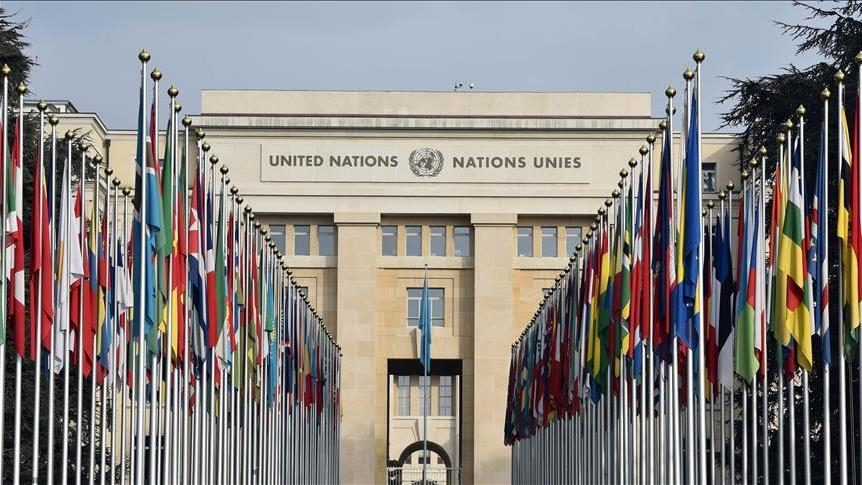Cultural, sports neutrality ends where genocide begins, says UN special rapporteur
Alexandra Xanthaki warns that inaction from sports, cultural bodies over Gaza signals impunity for future atrocities

- Question of banning genocidal nations is not political but humanitarian, she adds
- Switzerland, where many organizations are headquartered, also has responsibility under international law
GENEVA
When the Russia-Ukraine war began in 2022, international sports and cultural bodies moved swiftly.
FIFA and UEFA banned Russian teams from competition within days, and the Eurovision Song Contest expelled Russia altogether. At the time, officials said the decisions reflected a shared responsibility to uphold universal values.
Two years later, as a UN committee finds that Israel is committing genocide in Gaza, those same institutions are treading carefully.
Votes on Israel's suspension, both from football and Eurovision, have been delayed, officially due to the current situation in the Middle East – a hesitation that coincided with a ceasefire plan being pursued.
For UN Special Rapporteur on Cultural Rights Alexandra Xanthaki, this sudden caution exposes a troubling inconsistency.
"We cannot continue business as usual and sports cannot pretend that they don't have to take a position. When we talk about the genocide in Gaza, we do not refer to geopolitics. We refer to one of the very few values we have all agreed as humanity to respect,” Xanthaki told Anadolu.
Her position stands in contrast to that of FIFA President Gianni Infantino, who recently said that "FIFA cannot solve geopolitical problems," stressing instead the organization's role in "promoting football around the world by harnessing its unifying, educational, cultural and humanitarian values."
Xanthaki argued that this position risks confusing neutrality with indifference.
"It is not that I asked them to play in the sphere of politics," she said. "It's exactly the opposite – I asked them to stop playing in the sphere of politics and just focus on common values of humanity, which is the prohibition of genocide."
The contrast is also visible in action. Infantino was the one declaring that "football is fully united in solidarity" when FIFA and UEFA suspended Russia following its war in Ukraine.
The pattern extends beyond sports. Eurovision’s organizers banned Russia within days of its attack on Ukraine and have never revisited the decision. Yet this year, as calls grew to suspend Israel from the competition, the event’s governing body deferred a decision.
'History will judge them'
Xanthaki criticized the hesitation to vote on Israel’s suspension from international cultural and sporting bodies, saying the delays send a dangerous message.
“There was no reason to delay the vote,” she said. "I think that these associations, for the moment, have a very difficult decision, but a very crucial decision for their future," she said, stressing: "History will judge them."
Xanthaki warned that inaction risks normalizing impunity for future atrocities.
"They (institutions) cannot stay without doing anything, because then, the next state that is going to think about genocide is not going to be fearful of any organization or of anyone taking action,” she said.
Xanthaki noted that international institutions have taken decisive action in “extreme situations” before, citing cultural and sporting boycotts during South Africa’s apartheid era.
Because many of these organizations, including FIFA, UEFA and the European Broadcasting Union, are headquartered in Switzerland, she said the country also bears responsibility under international law.
“Switzerland is under the obligation to take measures so that everyone in its territory respects, or at least does not harm, human rights,” she said, adding that other host nations “will also have to think about what measures they should take.”
She also drew a distinction between state representation and individual participation. "Public organizations that represent the state should be banned, but individual athletes should not because they do not represent the state,” she said.
As an example, she pointed to the Olympic Games, where Russian athletes were allowed to compete under a neutral status – without their flag, anthem or national symbols – a model she said could also apply in the case of Israel.
"Any state that is engaged in acts of genocide has to be pushed aside,” Xanthaki said. "Any state that stops being responsible for genocide and takes measures for accountability and for listening to the voices of the victims has to be allowed to come in again."
Xanthaki stressed that her position does not ignore the Oct. 7, 2023, attack by Hamas.
“In human rights, we don't speak in terms of reciprocity – you kill 10, so I kill 100. And we are not talking about a state decision that was taken to eliminate, on purpose, a whole people."
She said Israel’s participation in international cultural and sporting events should remain suspended until the genocidal actions end.
“The fires of the bombs are still burning, the children are still without food,” she said. “And we are still talking about huge violations of human rights.”








